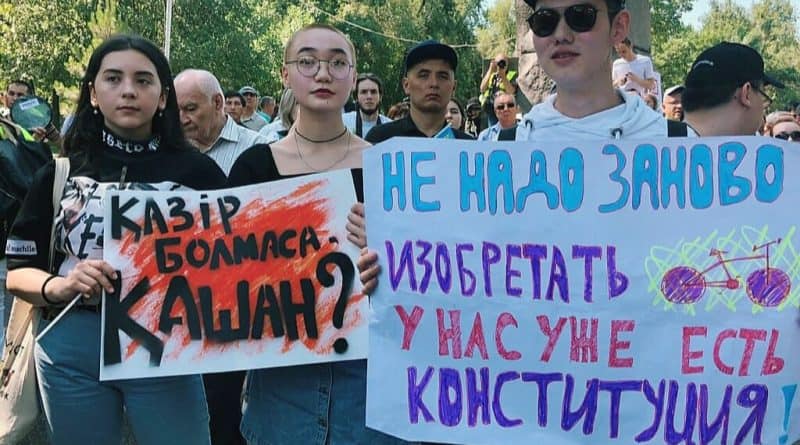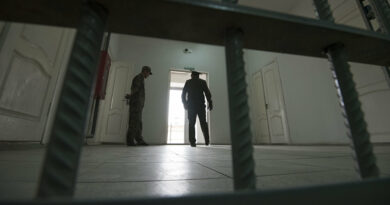Kazakhstan: bill on peaceful assemblies doesn’t meet international standards
The international non-governmental organization Freedom House, which studies the state of political and civil liberties in the world, expressed concern about the draft law on peaceful assemblies, which has already been approved by Kazakh deputies.
“We are concerned about the decision of the Senate of Kazakhstan to accelerate the adoption of the law on peaceful assemblies at a time when COVID-19 quarantine is in force in the country. The fact that a law, strictly restricting peaceful assemblies, is adopted during a state of emergency, with insufficient transparency and without public consultation, raises serious concerns about the democratic process in Kazakhstan. This step is particularly worrying after the government rejected the repeated demands of civil society to ask an expert opinion on the bill from the OSCE Office for Democratic Institutions and Human Rights on the grounds that, in their opinion, it is contrary to international standards for peaceful assemblies. We urge the Kazakh authorities to postpone the vote on the bill and ask them to submit it to the OSCE for consideration,” said Mark Berendt, Freedom House program director for Europe and Eurasia.
The organization recalled that the Kazakh authorities introduced a state of emergency in the country on March 15. As part of the emergency, all mass events, including rallies and peaceful protests, were banned in the republic.
Against this background, deputies of the lower house of the Kazakh Parliament held hearings on the draft law on peaceful assemblies on April 8 and approved in the second reading draft amendments to toughen penalties for violating the law on peaceful assemblies.
After that, the bill was submitted to the upper house of the Parliament of Kazakhstan [the Senate].
Recall, as ACCA already reported, the order to develop a new law “On peaceful assemblies, rallies and processions” was given by the President of Kazakhstan Kasym-Zhomart Tokaev in December last year.
“We should start introducing the notification principle of organizing rallies, which is in line with our Constitution,” the head of state said at the meeting of the National Council of Public Confidence (NCPC). “Rallies are admissible if they don’t violate the law, don’t violate public order and don’t interfere with the peace of citizens. This is my principled position. You know it. We will adopt it legislatively. The time has come to set a rally culture in the public mind. But people have to understand that rallies are not only a right, but also a responsibility. In my message in September, I already spoke about the need to improve the legislation on rallies. Today at the meeting of the NCPC, I want to say that in the framework of the implementation of the plan for the realization of the presidential message, a draft law “On peaceful assemblies” has been developed. It will clearly define all forms of peaceful assembly, establish the competence of local elected bodies to determine specialized places, as well as concepts such as the status of the organizer, as well as the participant and observer, their rights and obligations.”
Later, it became clear that the draft law, prepared by the Ministry of Information and Public Development, is very different from the draft that was prepared by the expert community and members of the NCPC.
The well-known human rights activist, the director of the Kazakhstan’s International Bureau for Human Rights and Rule of Law, Yevgeny Zhovtis, said that the bill, developed by the Ministry of Information and Public Development, is nothing more than a “reservation for those who disagree.”
“We will try to provide our citizens as much as possible with free communications with the state, with the authorities at any sites where this can be done, and not in some park where they will not go anyway. Practice has already shown it. And relieving tension by peaceful gatherings is much more convenient than driving people into some reservations that will be more annoying,” Zhovtis noted then.
Meanwhile, Freedom House noted that on April 21, the UN Special Rapporteur on the rights to freedom of peaceful assembly appealed to the Kazakh government stating that “certain parts of the new law don’t comply with international human rights standards, or rather – the right to freedom of peaceful assembly, guaranteed by the article 21 of the International Covenant on Civil and Political Rights, which Kazakhstan ratified in 2016.
“A group of civil society organizations of Kazakhstan and their international allies called on the government to submit the bill to the OSCE and the UN for examination. However, on April 30, the Senate passed the bill in first reading,” Freedom House said, recalling that Kazakhstan was given the status of “not free” in the ratings “Freedom in the World 2020” and “Freedom in the Network 2020”.




